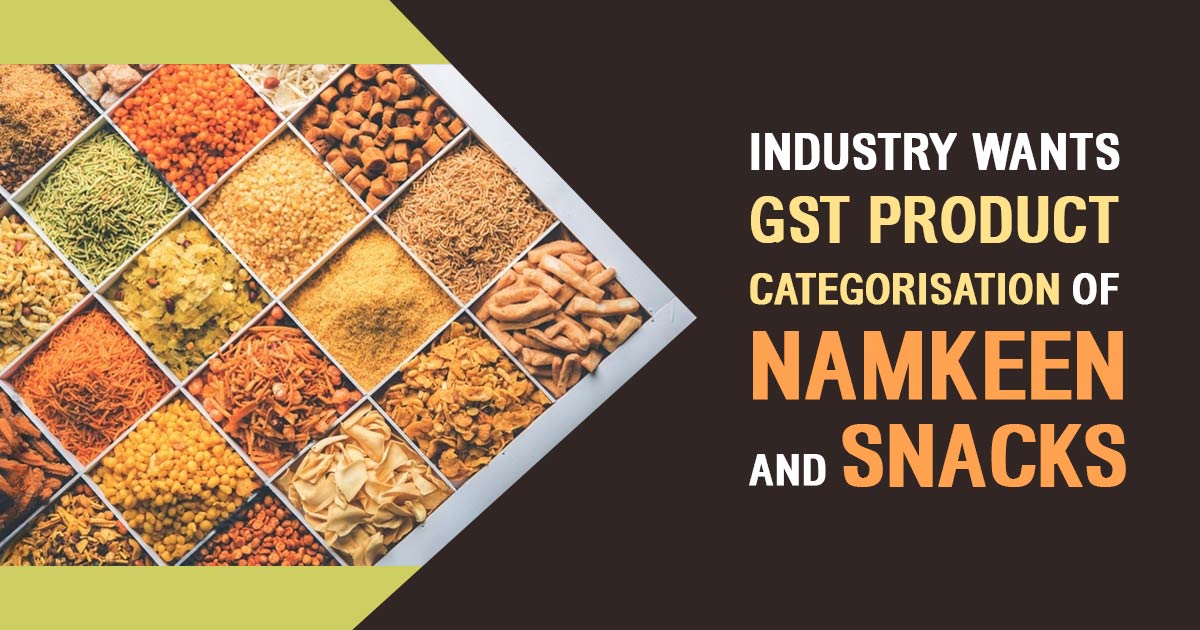
The current uncertainty about the categorization of Snacks and Namkeens for Goods and Services Tax (GST) rates is once again causing confusion. The snacks industry is now seeking absolute consideration from the government regarding the status of namkeens, fryums, and snacks, following a series of notices issued by the Directorate General of GST Intelligence (DGGI), according to sources.
The DGGI has sent notices to industry players, demanding GST at a rate of 18%. However, the industry believes that namkeens and related snacks should fall under the 12% GST bracket, as per the HSN Code 2106. Additionally, they argue that uncooked and unfried snack pellets should attract a 5% GST rate.
The industry’s stand relied on a 2012 Supreme Court ruling in a case between the government and Pepsi Foods Ltd., where Kurkure was classified as Namkeen. Following the Supreme Court’s decision, since then the Namkeen come under the 12% GST bracket. Accordingly, Pepsi Foods and other industry players have been filing GST at 12% for Namkeen.
Contrarily, sources reveal that the DGGI holds the opinion that certain nankeens and snacks, such as chips, should be subject to a 12% GST rate. On the other hand, an 18% GST rate is applicable on other namkeens and snacks that undergo processes like frying or extrusion.
Examples of such products in this category include Bhujia, Kurkure, Cheetos, some varieties under Bingo, and similar Namkeens and snacks that involve extrusion processes, attracting an 18% rate.
The confusion arising from this unclear GST classification has become a significant issue for both the government and the industry. In January 2023, the Central Board of Indirect Taxes and Customs (CBIC) issued a circular providing clarification regarding the classification and tax rate for snack pellets, such as fryums, produced using extrusion methods.
According to the circular, these snack pellets should be categorized under the HSN Code 1905 and are subject to an 18% GST rate. Furthermore, in August 2023, another circular was issued stating that uncooked and unfried snack pellets would be subject to a 5% GST rate.
Notable industry players affected by this issue include PepsiCo, Haldirams, ITC, Pratap Snacks, Bhikaji, and Bikano, among others.
It remains crucial to observe the stand the government and GST Council will take after considering the ongoing representation from the industry and the outcome of the issued DGGI notices.
Experts have highlighted the lack of clarity on this issue and recommend that the GST Council should offer precise clarification to establish a clear stand forward.
The primary goal of the GST Council and the select committee report on rates was to impose lower tax rates on essential goods, including food items. However, a higher 18% tax rate for snacks produced through extrusion processes creates an inconsistency in the taxation of namkeens and snacks.
Read Also:- Revised GST Slab Rates in India by GST Council
In simpler terms, a tax expert who has presented arguments in a writ court case regarding the arbitrary difference in tax rates on these products has explained that there is a lack of logical differentiation to justify the imposition of a higher tax rate based on the essential process required to prepare such snacks.
Furthermore, the expert added that determining tax rates is unquestionably a policy decision of the legislature. However, when such a policy decision becomes arbitrary, vague, or produces absurd results, it may be subject to scrutiny for constitutional validity.
The ready-to-eat food processing industry in India, currently is at rapid growth, making it one of the fastest-growing sectors. However, the industry faces various challenges concerning the classification of products in section 16 under the GST Act. since it is dynamic and constantly evolving product lines.
This issue is particularly prominent in the classification and tax rate determination of processed food items like namkeen, bhujia, snacks, and similar edible products. Since the implementation of GST, there have been multiple changes in the tax schedule related to these items, adding to the ambiguity.
Important: Can One GST Rate Make Product Classification Easier, Check
The GST law provides specific tax rates for particular packaged and labelled products such as namkeen, bhujia, and chabena, as well as un-fried/un-cooked snack pellets. However, there is a lack of clarity regarding the classification of various other products, including chips, packed samosas, mathris, and similar items.
As a result, the industry has adopted different tax positions based on factors such as the recipe, trade terminology, and method of preparation. This variance in tax positions has led to scrutiny by the Directorate General of GST Intelligence (DGGI) authorities in recent times.
Also Read: GST Council Removes Tax Obstacles for Trading in Indian Rupees
To address this issue and provide much-needed relief to the industry, the GST Council must offer clear guidance on the classification and tax rates for ready-to-eat food items mentioned above. Adequate clarification from the council will help settle the ongoing debate and ensure a fair and consistent approach, as emphasized by another tax expert.










yes we all are in same boat in the case of Namkeen classification. is there any subsequent update from the council? i don’t know how much Rajasthan high court decision in the case of Kurkure as Nankeen will help the industry to represent.
can i know the names of industry players who have represented this Namkeen case with the council? please keep me posted with the development.